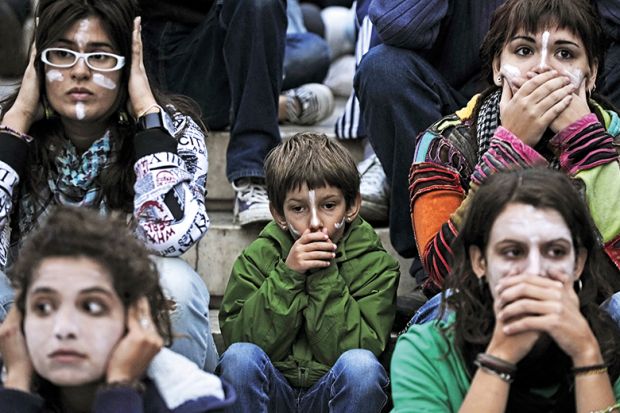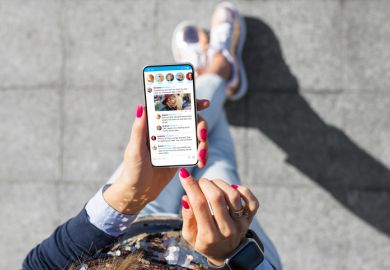According to innumerable media reports, “kids these days” don’t properly understand or value free speech. The spate of illiberal currents and identitarian blowups in recent years can be blamed on the arrival of Gen Z on college campuses and, later, the workplace.
Except that they can’t. Members of Gen Z may indeed hold importantly different perspectives on risk, conflict and identity compared with previous cohorts. However, these differences are not the cause of the “Great Awokening” and the struggles over status and power that have accompanied it. For that, we have to look to “adults these days”.
For example, the radical shifts in media discourse, focusing intensely on identity-based discrimination and prejudice, began after 2011 – when the oldest members of “Gen Z” (born in 1997) were only 14. Obviously, they weren’t working as journalists or in editorial roles deciding what gets published. Nor were they the primary audience that media companies and advertisers were trying to reach.
Protests also increased in 2011, exemplified by the rise of the Occupy Wall Street movement. However, more than 65 per cent of Occupy protesters were 30 years or older at the time (they’d be over 40 today). Subsequent studies looking at the post-2015 #Resistance marches (the Women’s March, the March for Science, the March for Racial Justice) put the average age of demonstrators at 38-49.
Likewise, teenagers and tweens couldn’t possibly have been responsible for the dramatic shifts in academic culture, administration and research since 2011. People generally don’t even begin publishing in academic journals until at least their mid-twenties, and more senior scholars in their forties and fifties typically determine what gets through.
The ideas associated with the Great Awokening have been circulating for decades, developed largely by mid-career professionals, imposed on institutional policies and educational curricula by bureaucrats and implemented by teachers from K-12 through college, pushed on Gen Z during some of their most formative years (largely to their detriment, research suggests, to the extent that young people internalised these messages at all).
Recent rules micromanaging student interactions or encouraging students to report their peers and professors for any perceived offence were likewise developed and imposed by adults, mostly before Gen Z set foot on college campuses and well before they began to comprise a majority of undergrads (around 2017).
Nor was Gen Z responsible for most decisions over the past decade to terminate employees with little to no due process based on social media outrage and unsubstantiated accusations or for defying prevailing orthodoxies or committing unintentional social faux pas. Although young people often participated in these outrage campaigns, senior management ultimately made the decisions to let people go. And financial considerations are typically far more central to such decisions than concerns about what young people think or say.
Similar realities hold for trends in censorship and self-censorship in science. Yes, as colleagues and I illustrate in a new study in Proceedings of the National Academy of Sciences (PNAS), censorship seems to have grown worse in recent years. However, it’s often driven by scientists rather than students.
Sometimes academics self-censor to protect themselves – not just because they’re concerned about preserving their jobs, but also out of a desire to be liked and included within their disciplines and institutions, or because they don’t wish to create problems for their advisees (at the hands of intolerant professors and other gatekeepers).
Other times, scholars attempt to suppress their own or others’ findings because they view them as incorrect, misleading or potentially dangerous. Sometimes scientists try to squash public discussion of contentious issues for fear that it undermines public trust or scientific authority or provides ammunition for perceived bad actors. As mid-career professionals grew more focused on social justice after 2011, they probably also grew more likely to censor and self-censor in pursuit of these prosocial ends.
This reality has been obscured, in part, because professors often use students as foot soldiers in their censorious campaigns – for instance, by trying to cultivate complaints against colleagues they hope to purge, or by firing up students to demonstrate in the service of their pet causes.
According to data by the Foundation for Individual Rights and Expression (FIRE), roughly 45 per cent of attempts to punish US scholars for their teaching, research or speech are driven by students – often egged on by professors or others. While this is a lot, it’s also the case that most (55 per cent) of the time faculty face disciplinary action, the campaigns are led by colleagues, administrators or outside actors. Other forms of censorship (such as politically biased publication and institutional review board decisions) are driven almost exclusively by academics, not students.
Again, it might be true that Gen Z has idiosyncratic beliefs about free speech, but that’s not why knowledge economy institutions are so messed up. They were on a negative trajectory already – and seem to be turning a corner now, even as Gen Z are enrolling in ever-growing numbers.
The kids are alright. It’s the adults you have to worry about.
Musa al-Gharbi is a sociologist and assistant professor in the School of Communication and Journalism at Stony Brook University and a research fellow at Heterodox Academy.
Register to continue
Why register?
- Registration is free and only takes a moment
- Once registered, you can read 3 articles a month
- Sign up for our newsletter
Subscribe
Or subscribe for unlimited access to:
- Unlimited access to news, views, insights & reviews
- Digital editions
- Digital access to THE’s university and college rankings analysis
Already registered or a current subscriber?




